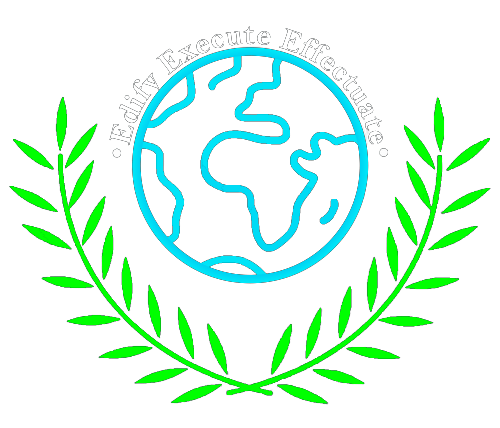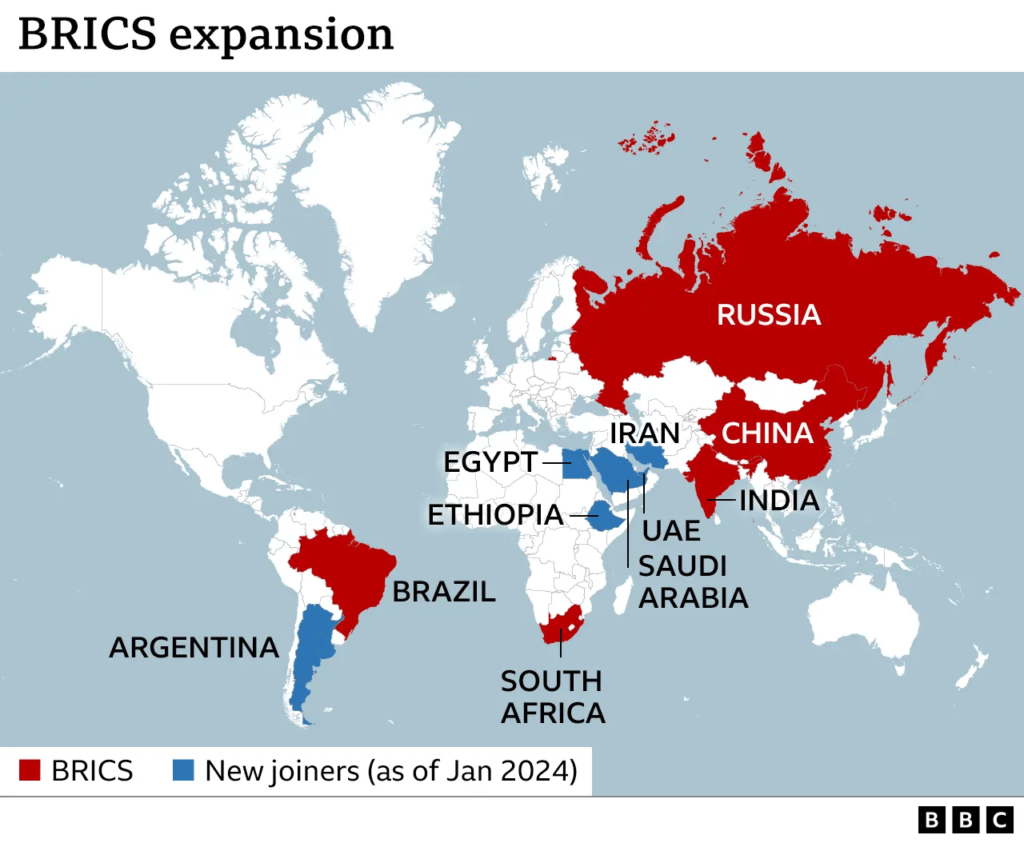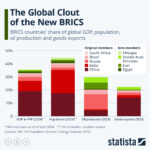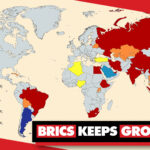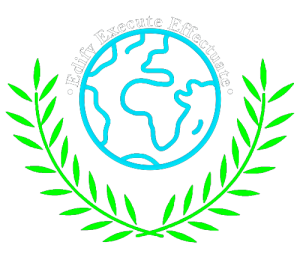EXPANSION OF BRICS: GEOPOLITICAL AND ECONOMIC IMPLICATIONS
-By Ravishen Jain, Finance Intern, IISPPR
ABSTRACT
The expansion of BRICS, with the inclusion of key economies like Saudi Arabia and Iran, is reshaping global geopolitical and economic landscapes. With strategic partnerships focusing on energy security and resource-rich nations, BRICS aims to position itself as a strong alternative to Western-led alliances. The group’s growing influence in international organizations underscores its importance in global policymaking, enhancing its geopolitical clout and economic significance.
NEW MEMBERS
BRICS expanded its membership in 2023 with the inclusion of Saudi Arabia, Iran, and other emerging economies. This shift aims to diversify the group’s economic and geopolitical influence. Saudi Arabia’s oil reserves and Iran’s strategic location further strengthen BRICS’ position in the global energy sector, enhancing its capacity to influence international markets.
The membership expansion reflects BRICS’ commitment to building a more multipolar world order, where diverse economic and geopolitical forces can collaborate. By welcoming key players from the Middle East, BRICS reinforces its ability to address global challenges and assert itself as a significant bloc in shaping international policy. As of 2025, the new members contribute significantly to BRICS’ collective GDP, estimated to exceed $23 trillion.
Recent discussions around the expansion also include the integration of financial systems to support local currency trade and energy cooperation. The growing economic weight of these new members is expected to enhance BRICS’ leverage in both energy markets and global trade dynamics.
CONTINGENT RESERVE ARRANGEMENT
The Contingent Reserve Arrangement (CRA) is a financial mechanism established by BRICS to provide member countries with a safeguard against liquidity crises and external financial shocks. Initially introduced in 2014, the CRA was designed to enhance financial stability within the bloc by offering a pooled reserve fund that member nations can access in times of economic distress. With an initial commitment of $100 billion, the arrangement serves as a buffer against short-term balance of payments pressures and currency volatility, reducing reliance on traditional financial institutions like the International Monetary Fund (IMF).
ENERGY SECURITY
Energy security has become a cornerstone of BRICS’ economic strategy, with partnerships focused on resource-rich nations like Russia, Saudi Arabia, and Iran. These countries provide critical energy supplies, including oil, gas, and renewable energy resources, which strengthen BRICS’ collective energy security. The formation of a strategic energy partnership aims to secure long-term energy resources for BRICS members, diversifying energy sources and reducing reliance on Western-dominated energy markets.
By 2025, BRICS is focusing on renewable energy investments through its New Development Bank (NDB), with over $5 billion allocated to clean energy projects across member states. BRICS is also exploring energy trade agreements, including energy financing and joint ventures in oil and gas exploration, to enhance cooperation among its members and bolster economic growth.
These energy initiatives also align with BRICS’ broader goal of promoting sustainable development in the Global South. The group is working toward energy solutions that support the energy transition and economic development without increasing dependency on external powers.
GEOPOLITICAL REALIGNMENT
BRICS is increasingly positioning itself as an alternative to Western-led alliances, particularly the U.S.-dominated systems like NATO and the World Bank. This geopolitical realignment reflects a growing desire among BRICS nations to challenge the existing global order, emphasizing sovereignty, equity, and multipolarity. The inclusion of Saudi Arabia and Iran signals a clear move towards reducing the dominance of Western institutions in shaping global policies.
In 2025, BRICS has advanced discussions on establishing a unified voice in international forums like the United Nations and the International Monetary Fund. The bloc aims to assert itself in global decision-making processes, pushing for reforms in institutions that have long been influenced by the West. This geopolitical shift is expected to have far-reaching consequences for international trade, security arrangements, and diplomatic negotiations.
By aligning itself with emerging economies and resource-rich nations, BRICS is strengthening its geopolitical influence, positioning itself as a leading voice for global development and stability. These actions signal the rise of a new multipolar world where power is shared more equally among major global players.
GLOBAL INFLUENCE
BRICS’ increasing global influence is reflected in its growing role in international organizations such as the United Nations, World Trade Organization, and International Monetary Fund. As a bloc, BRICS advocates for reforms in global governance structures to make them more representative of the Global South. The group’s collective economic power, which now represents over 40% of the world’s population and more than 25% of global GDP, strengthens its voice in policymaking.
Since 2024, BRICS has been instrumental in shaping global trade agreements, advocating for the reduction of trade barriers and a more equitable distribution of economic benefits. The bloc’s participation in high-level diplomatic forums has raised its profile as a key global player, influencing policies related to climate change, development, and regional security.
The expansion of BRICS to include more nations has bolstered its influence in international policymaking. By 2025, BRICS is expected to contribute to a more balanced global policy framework, where the interests of developing nations are better represented. The group’s increasing involvement in major global negotiations solidifies its role as a central force in shaping the future of global governance.
BIBLIOGRAPHY
- Building better global Economic BRICs. (2001, November 30). Goldman Sachs. https://www.goldmansachs.com/insights/goldman-sachs-research/building-better
- Scaffardi, L. (2014). BRICS, a Multi-Centre “Legal network”? Beijing Law Review, 05(02), 140–148. https://doi.org/10.4236/blr.2014.52013
- Levine, R. (1999 World Bank Policy Research Working Paper. https://doi.org/10.1596/1813-9450-1678
- Rogoff, K. (2024). Global financial safety nets: The rise of regional mechanisms. Brookings Institution.
- Reinhart, C. (2024). De-dollarization and its implications for emerging markets. Harvard Economic Review.
- Sachs, J. (2024). BRICS and the global South: Pathways to inclusive growth. Columbia University Press.
- Roubini, N. (2024). The BRICS challenge to Western financial dominance. Foreign Affairs.
- The rise of BRICS. (n.d.). Russia in Global Affairs. https://eng.globalaffairs.ru/articles/the-rise-of-brics/
- SA, C. (2024, October 25). IMF Growth Forecasts : BRICS to lead global growth in five years. Capmad.com. https://www.capmad.com/economy-en/imf-growth-forecasts-brics-to-lead-global-growth-in-five-years/
- Richter, F. (2024b, October 22). The global clout of the new BRICS. Statista Daily Data. https://www.statista.com/chart/33311/brics-share-of-global-gdp-and-population/
- Norton, B. (2025, January 7). BRICS expands with new partner countries, geopolitical Economy Report. https://geopoliticaleconomy.com/2024/12/25/brics-expands-9-partner-countries-population-economy/
